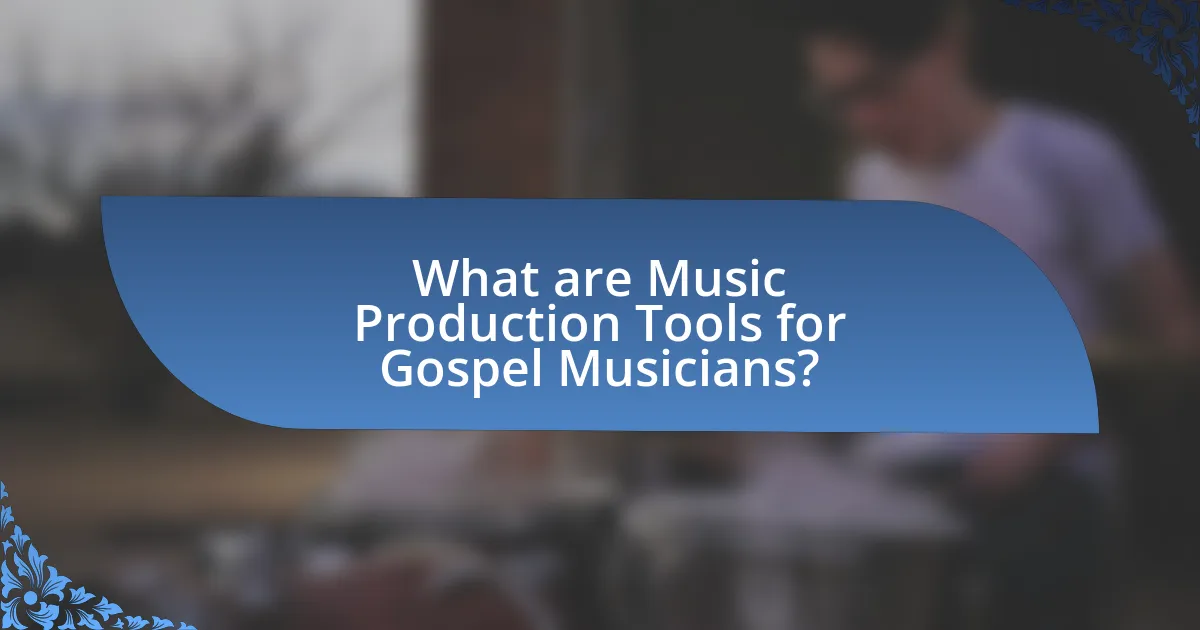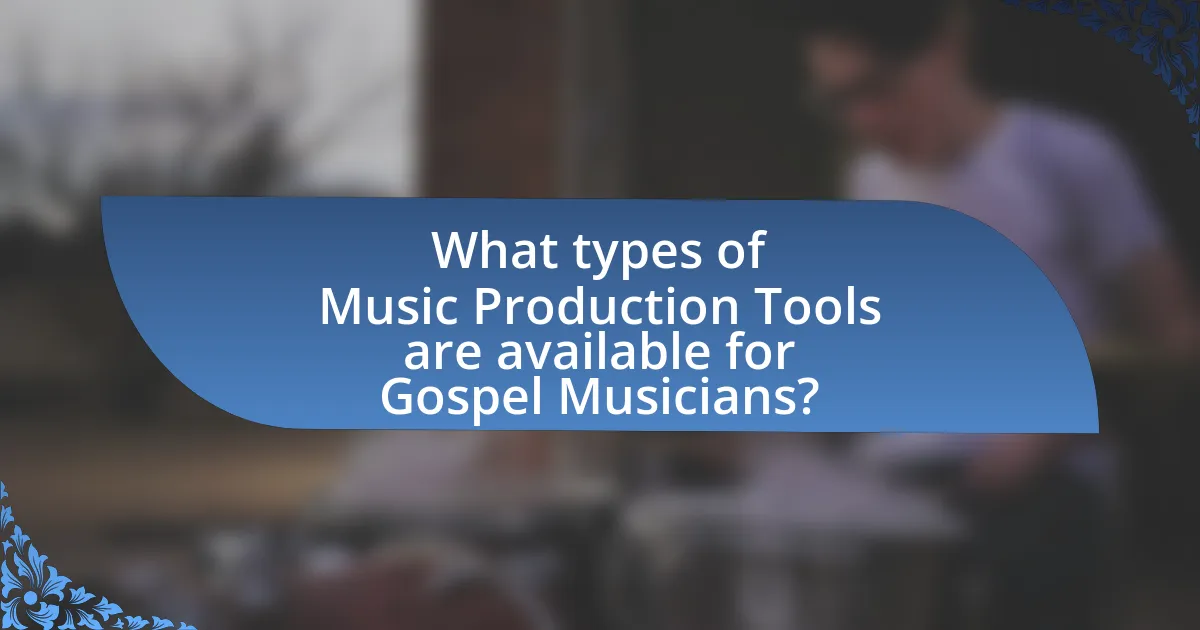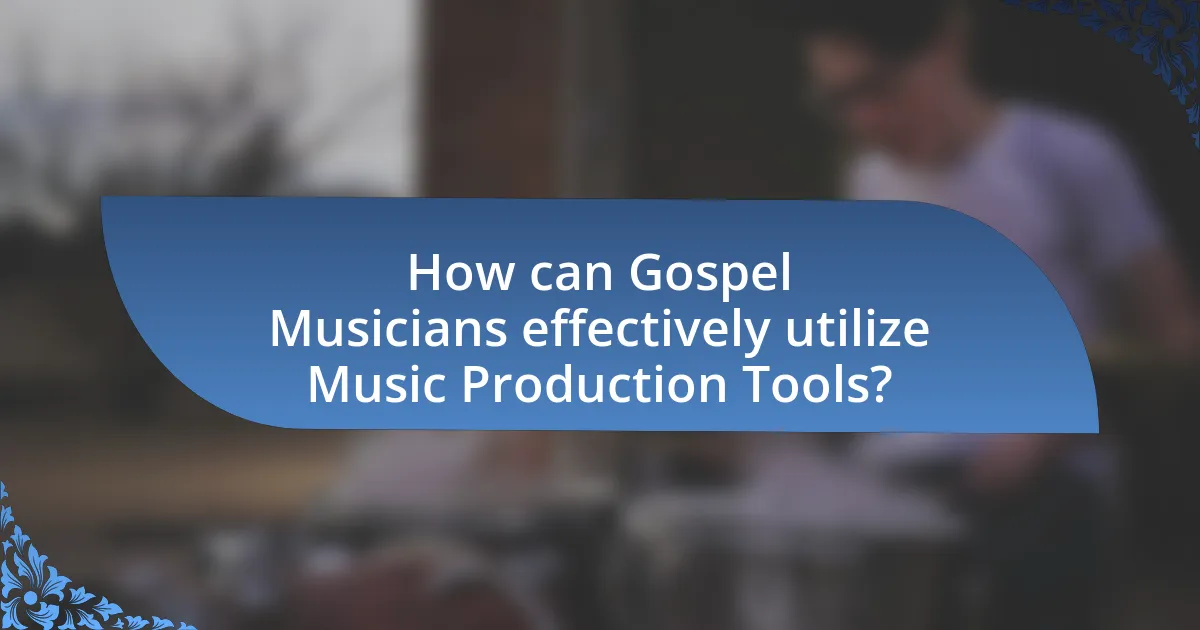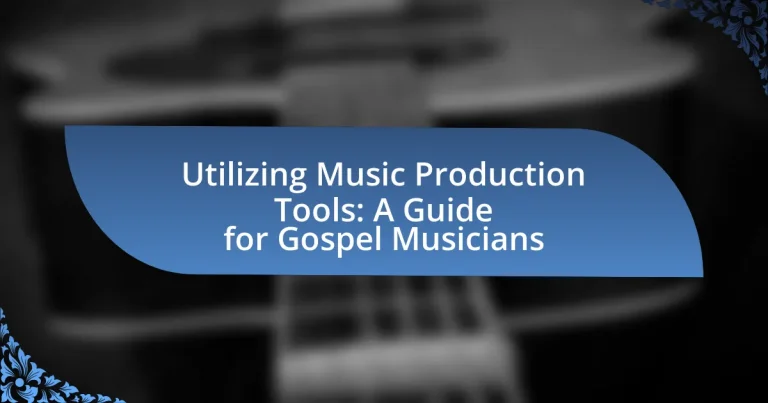The article focuses on the utilization of music production tools specifically for gospel musicians, highlighting essential equipment such as digital audio workstations (DAWs), audio interfaces, microphones, and virtual instruments. It discusses how these tools enhance the music creation process by improving sound quality, facilitating composition and arrangement, and streamlining workflows. Additionally, the article outlines key features to look for in production tools, common challenges faced by musicians, and strategies for effective use, including collaboration and ongoing learning resources. Overall, it serves as a comprehensive guide for gospel musicians aiming to produce high-quality recordings that resonate with their audience.

What are Music Production Tools for Gospel Musicians?
Music production tools for gospel musicians include digital audio workstations (DAWs), audio interfaces, microphones, and virtual instruments. DAWs like Ableton Live and Logic Pro X allow musicians to record, edit, and mix their music efficiently. Audio interfaces, such as Focusrite Scarlett, facilitate high-quality sound input and output. Microphones, including Shure SM58, are essential for capturing vocals and instruments. Additionally, virtual instruments and plugins, like Native Instruments Komplete, provide a wide range of sounds and effects that enhance gospel music production. These tools are widely used in the industry, supporting gospel musicians in creating professional-quality recordings.
How do these tools enhance the music creation process?
Music production tools enhance the music creation process by providing musicians with advanced capabilities for composition, arrangement, and sound design. These tools, such as digital audio workstations (DAWs), virtual instruments, and plugins, allow for greater creativity and efficiency in producing high-quality music. For instance, DAWs enable musicians to record, edit, and mix audio tracks seamlessly, while virtual instruments offer a wide range of sounds that can be manipulated to fit various musical styles. Additionally, plugins can enhance audio quality and add effects, making it easier for gospel musicians to achieve professional-sounding recordings. The integration of these tools streamlines workflows, reduces production time, and fosters innovative musical expression.
What specific features should gospel musicians look for in production tools?
Gospel musicians should look for production tools that offer high-quality audio recording, user-friendly interfaces, and versatile sound libraries. High-quality audio recording ensures that the nuances of gospel music, such as vocal harmonies and instrumental richness, are captured accurately. User-friendly interfaces facilitate ease of use, allowing musicians to focus on creativity rather than technical difficulties. Versatile sound libraries provide a range of instruments and effects that can enhance the gospel sound, enabling musicians to experiment with different styles and arrangements. These features are essential for producing professional-quality gospel music that resonates with audiences.
How do different tools cater to various aspects of gospel music production?
Different tools cater to various aspects of gospel music production by providing specialized functionalities that enhance composition, recording, mixing, and mastering processes. Digital Audio Workstations (DAWs) like Ableton Live and Logic Pro offer comprehensive environments for arranging and editing gospel tracks, allowing musicians to layer vocals and instruments effectively. MIDI controllers enable precise input of musical notes and rhythms, which is crucial for creating intricate gospel harmonies.
Additionally, audio interfaces improve sound quality during recording by converting analog signals to digital, ensuring that vocal performances capture the emotional depth characteristic of gospel music. Plugins and virtual instruments expand sound palettes, offering gospel musicians access to authentic organ sounds or choir effects that are essential for the genre.
Furthermore, collaboration tools facilitate remote work among musicians, enabling them to contribute to projects from different locations, which is increasingly important in modern music production. These tools collectively support the unique requirements of gospel music, ensuring that the final product resonates with the intended spiritual and emotional impact.
Why is it important for gospel musicians to utilize music production tools?
It is important for gospel musicians to utilize music production tools because these tools enhance the quality and reach of their music. By employing software and hardware designed for music production, gospel musicians can create polished recordings that resonate with audiences, thereby increasing their impact and effectiveness in conveying their message. For instance, the use of digital audio workstations (DAWs) allows for precise editing, mixing, and mastering, which are essential for producing professional-sounding tracks. Additionally, statistics show that high-quality production can lead to greater streaming numbers and audience engagement, as listeners are more likely to share and promote well-produced music.
What advantages do these tools provide in terms of sound quality?
Music production tools enhance sound quality by providing advanced features such as high-resolution audio processing, precise equalization, and dynamic range control. These features allow musicians to achieve clearer, more balanced mixes, resulting in a professional sound. For instance, digital audio workstations (DAWs) enable the manipulation of audio tracks with minimal loss of fidelity, while plugins like equalizers and compressors help to refine the tonal balance and dynamics of recordings. Studies have shown that professional-grade tools can significantly improve the perceived quality of music, making it more engaging for listeners.
How can production tools help in the arrangement and composition of gospel music?
Production tools enhance the arrangement and composition of gospel music by providing musicians with advanced capabilities for sound design, layering, and editing. These tools, such as digital audio workstations (DAWs), allow for precise control over individual tracks, enabling the integration of various instruments and vocal harmonies that are characteristic of gospel music. Additionally, features like MIDI sequencing facilitate the creation of complex arrangements, while built-in effects and plugins can enrich the overall sound quality. The use of production tools also streamlines the workflow, allowing for quicker revisions and experimentation, which is essential in the creative process of gospel music composition.

What types of Music Production Tools are available for Gospel Musicians?
Gospel musicians have access to various music production tools that enhance their creative process. These tools include Digital Audio Workstations (DAWs) like Ableton Live and Logic Pro, which allow for recording, editing, and mixing music. Additionally, virtual instruments and plugins, such as Native Instruments Komplete and Waves audio plugins, provide a wide range of sounds and effects tailored for gospel music. Hardware tools like MIDI controllers and audio interfaces, such as the Focusrite Scarlett series, facilitate better control and sound quality during production. Furthermore, cloud-based collaboration platforms like Splice enable gospel musicians to work together remotely, sharing projects and samples efficiently. These tools collectively support the unique needs of gospel musicians in producing high-quality music.
What are the main categories of music production tools?
The main categories of music production tools include Digital Audio Workstations (DAWs), audio interfaces, MIDI controllers, microphones, studio monitors, and plugins. Digital Audio Workstations, such as Ableton Live and Pro Tools, serve as the primary software for recording, editing, and producing music. Audio interfaces facilitate the connection between instruments and computers, ensuring high-quality sound capture. MIDI controllers allow musicians to input musical data into DAWs, enhancing creativity and efficiency. Microphones are essential for capturing vocals and instruments, while studio monitors provide accurate sound reproduction for mixing and mastering. Plugins, which can be effects or virtual instruments, expand the capabilities of DAWs, allowing for a diverse range of sounds and processing options. Each category plays a crucial role in the music production process, contributing to the overall quality and creativity of the final product.
How do digital audio workstations (DAWs) differ from hardware tools?
Digital audio workstations (DAWs) differ from hardware tools primarily in their flexibility and functionality. DAWs are software-based platforms that allow users to record, edit, and produce audio using a computer, offering extensive features such as virtual instruments, effects, and automation capabilities. In contrast, hardware tools are physical devices, like mixers and synthesizers, that often have a fixed set of functions and require more physical space and investment. DAWs enable easy integration of various audio sources and plugins, while hardware tools typically require separate units for different tasks, making DAWs more versatile for modern music production.
What role do virtual instruments play in gospel music production?
Virtual instruments are essential in gospel music production as they provide a wide range of sounds and textures that enhance the musical arrangement. These digital tools allow producers to simulate traditional gospel instruments, such as organs, pianos, and strings, enabling a fuller sound without the need for physical instruments. Additionally, virtual instruments offer flexibility in composition and arrangement, allowing for easy manipulation of sounds and integration of various musical styles. Their use has become increasingly prevalent, with many gospel tracks incorporating synthesized sounds to create contemporary worship music, reflecting the genre’s evolution while maintaining its spiritual essence.
Which specific tools are recommended for gospel musicians?
Gospel musicians are recommended to use tools such as digital audio workstations (DAWs) like Ableton Live, Logic Pro, and Pro Tools for music production. These DAWs provide comprehensive features for recording, editing, and mixing music, which are essential for creating high-quality gospel tracks. Additionally, software instruments and plugins like Native Instruments Komplete and Waves plugins enhance sound quality and offer a variety of sounds suitable for gospel music. Furthermore, hardware tools such as MIDI controllers, audio interfaces, and studio monitors are crucial for effective music production, ensuring that gospel musicians can produce and perform their music with clarity and precision.
What are the top DAWs favored by gospel musicians?
The top DAWs favored by gospel musicians include Logic Pro X, Ableton Live, and Pro Tools. Logic Pro X is popular for its extensive library of sounds and user-friendly interface, making it ideal for gospel music production. Ableton Live is favored for its versatility in live performances and studio settings, allowing gospel musicians to create dynamic arrangements. Pro Tools is recognized for its professional-grade audio editing capabilities, which are essential for high-quality gospel recordings. These DAWs are widely used in the gospel music community due to their robust features that cater to the genre’s specific needs.
How do plugins enhance the production process for gospel music?
Plugins enhance the production process for gospel music by providing a range of tools that improve sound quality, facilitate creative expression, and streamline workflow. These digital audio processing tools allow gospel musicians to manipulate audio tracks with effects such as reverb, compression, and equalization, which are essential for achieving the rich, layered sound characteristic of gospel music. For instance, reverb plugins can create a sense of space and depth, making vocal performances feel more immersive, while compression plugins help balance dynamic range, ensuring that softer and louder elements coexist harmoniously. Additionally, the use of virtual instruments and sample libraries through plugins enables musicians to incorporate diverse sounds and textures, enriching the overall production. The integration of these plugins into digital audio workstations (DAWs) also enhances efficiency, allowing for quicker edits and adjustments, which is crucial in a collaborative environment often found in gospel music production.

How can Gospel Musicians effectively utilize Music Production Tools?
Gospel musicians can effectively utilize music production tools by integrating digital audio workstations (DAWs), virtual instruments, and sound libraries into their creative process. These tools allow musicians to compose, arrange, and produce high-quality recordings that enhance their musical expression. For instance, DAWs like Ableton Live and Logic Pro X provide intuitive interfaces for recording and editing, while virtual instruments can replicate traditional gospel sounds, such as organs and choirs, enabling musicians to create rich, layered arrangements. Additionally, utilizing sound libraries can offer access to a wide range of samples and loops that can inspire new compositions. By mastering these production tools, gospel musicians can elevate their music, reach broader audiences, and maintain the authenticity of their genre.
What are the best practices for getting started with music production tools?
To get started with music production tools, first select a Digital Audio Workstation (DAW) that suits your needs, such as Ableton Live or FL Studio, as these platforms provide user-friendly interfaces and extensive features for beginners. Familiarize yourself with the basic functions of the chosen DAW, including recording, editing, and mixing, which are essential skills for effective music production. Additionally, invest in quality headphones or studio monitors to ensure accurate sound representation, as this will significantly impact your mixing and mastering processes. Engaging with online tutorials and communities can also enhance your learning experience, providing valuable insights and support from experienced producers.
How can gospel musicians learn to navigate their chosen DAW?
Gospel musicians can learn to navigate their chosen Digital Audio Workstation (DAW) by utilizing online tutorials, engaging in hands-on practice, and participating in community forums. Online platforms like YouTube and specialized music production websites offer a wealth of instructional videos that cover various DAW features and techniques. Hands-on practice allows musicians to familiarize themselves with the interface and tools, enhancing their proficiency. Additionally, joining community forums or social media groups dedicated to music production can provide valuable insights and tips from experienced users, fostering a collaborative learning environment. These methods are effective as they combine visual, auditory, and social learning styles, which are proven to enhance skill acquisition in music production.
What techniques can be employed to maximize the use of virtual instruments?
To maximize the use of virtual instruments, musicians should employ techniques such as effective sound layering, utilizing MIDI programming, and leveraging automation. Sound layering enhances depth and richness by combining multiple virtual instruments to create a fuller sound. MIDI programming allows for precise control over note timing, velocity, and expression, enabling musicians to craft intricate performances. Automation can dynamically adjust parameters like volume, panning, and effects over time, adding movement and interest to the music. These techniques are supported by the fact that many successful producers and musicians in various genres, including gospel, utilize these methods to achieve professional-sounding productions.
What common challenges do gospel musicians face when using production tools?
Gospel musicians commonly face challenges such as limited technical knowledge, inadequate access to high-quality production tools, and difficulties in balancing artistic expression with commercial viability. Limited technical knowledge often results in underutilization of available features in production software, which can hinder the quality of their music. Inadequate access to high-quality production tools can restrict their ability to produce professional-sounding recordings, as many gospel musicians may not have the financial resources to invest in expensive equipment. Additionally, the challenge of balancing artistic expression with commercial viability can lead to conflicts in creative direction, as musicians may feel pressured to conform to mainstream trends rather than staying true to their gospel roots.
How can musicians troubleshoot technical issues with their tools?
Musicians can troubleshoot technical issues with their tools by systematically identifying the problem, checking connections, and consulting user manuals. First, they should isolate the issue by testing each component individually, such as cables, instruments, and software settings. For example, if a microphone is not working, musicians should ensure it is properly connected and powered. Next, they can refer to the user manuals for troubleshooting tips specific to their equipment, which often include common issues and solutions. Additionally, online forums and communities can provide insights from other users who have faced similar challenges, enhancing the troubleshooting process.
What strategies can help overcome creative blocks during production?
To overcome creative blocks during production, musicians can implement strategies such as setting specific goals, taking breaks, and collaborating with others. Setting specific goals helps to create a clear direction, making it easier to focus on tasks and reduce overwhelm. Taking breaks allows the mind to reset, often leading to fresh ideas upon return. Collaboration introduces new perspectives and ideas, which can stimulate creativity and provide motivation. Research indicates that diverse collaboration can enhance creative output, as seen in studies by the University of Michigan, which found that teamwork can lead to more innovative solutions.
What tips can enhance the music production experience for gospel musicians?
To enhance the music production experience for gospel musicians, utilizing high-quality recording equipment is essential. Quality microphones and audio interfaces can significantly improve sound clarity and fidelity, which is crucial for capturing the nuances of gospel music. Additionally, gospel musicians should explore digital audio workstations (DAWs) that offer features tailored for vocal arrangements and harmonies, such as Logic Pro or Ableton Live. These tools facilitate the layering of vocals and instruments, allowing for a richer sound.
Moreover, incorporating virtual instruments and plugins can expand the sonic palette, enabling gospel musicians to experiment with different sounds and textures. Utilizing MIDI controllers can also streamline the production process, making it easier to compose and arrange music. Collaborating with other musicians and producers can provide fresh perspectives and ideas, enhancing creativity and innovation in the production process.
Finally, regular practice and experimentation with different production techniques can lead to improved skills and a more enjoyable music-making experience. By focusing on these aspects, gospel musicians can create high-quality music that resonates with their audience.
How can collaboration with other musicians improve the production process?
Collaboration with other musicians can significantly enhance the production process by introducing diverse skills, perspectives, and creative ideas. When musicians work together, they can combine their unique strengths, such as songwriting, instrumentation, and vocal techniques, leading to a richer and more innovative sound. For instance, a study published in the Journal of Music Theory found that collaborative songwriting often results in more complex and engaging compositions compared to solo efforts. Additionally, collaboration fosters a supportive environment where musicians can provide constructive feedback, ultimately refining the final product. This synergy not only accelerates the creative process but also increases the overall quality of the music produced.
What resources are available for ongoing learning and improvement in music production?
Online courses and tutorials are essential resources for ongoing learning and improvement in music production. Platforms like Coursera, Udemy, and Skillshare offer structured courses taught by industry professionals, covering various aspects of music production, from basic techniques to advanced mixing and mastering. Additionally, YouTube hosts numerous channels dedicated to music production, providing free tutorials and tips that cater to different skill levels. Furthermore, forums and communities such as Gearslutz and Reddit’s r/WeAreTheMusicMakers allow musicians to share knowledge, seek advice, and collaborate, fostering a continuous learning environment. These resources collectively support musicians in enhancing their production skills and staying updated with industry trends.


